Conduct a free Massachusetts warrant search efficiently and effectively on citizens throughout the state.
Search tools and other methods of accessing this information can be invaluable if you are concerned that you or someone you know has an outstanding warrant. Warrant details can help you be better informed about those in your life or serve to satisfy your curiosity.
The public availability of warrant details results from the Massachusetts Public Records Law and the federal government’s Freedom of Information Act. These laws were passed to ensure that the public could inspect the records created by government agencies.
The process for finding these records can change from agency to agency, but this article will walk you through the steps you can take to track down warrants in Massachusetts — including where to look and how to submit requests to each custodian who hosts them.
This resource was written by Attorney Robert Bailey Jr, who holds a Juris Doctorate from Widener University School of Law.
Does the Public Have the Right To Search for Warrants in Massachusetts?
Massachusetts Public Records Laws authorize the public to check for warrants and related information.
Various tools and resources are available to find out if you have a warrant or if someone you know does. There are also different types of warrants to search for, and information on the types that can be issued in Massachusetts will be explained later in this article.
However, when you perform a warrant search in Massachusetts, you may discover that some records are unavailable. That is because, while access is generally available, certain exceptions exist. For instance, certain active warrants may not be publicly available if it would interfere with an ongoing law enforcement investigation.
Also, warrant information may not be available if it contains sensitive, generally restricted information, such as juvenile data.
An Overview of Locating Warrants in Massachusetts
If you want to conduct a Massachusetts warrant roundup, you must be prepared with the necessary information; at a bare minimum, you should have the person’s name.
If you are searching at the county or municipal level, it’s also important to know the government agency or general location from where the warrant was issued.
Of course, the more information you have about the person and situation, the easier your search will be. Other descriptive information, such as date of birth or social security number, may help speed up your search.
Warrant information is available through various mediums. Some data can be accessed through online search tools, while others require an in-person search or a request by phone or mail.
Insights into warrants can be found at the state, county and city level. Below are helpful steps and resources to access warrant information at each level.
How To Run a Free Massachusetts Warrant Search on Yourself or Someone Else
If you are looking for warrants in Massachusetts, you can perform a case search for this information using the statewide Trial Court Case Access Search Tool.1 When using this tool to perform a free arrest warrant check, it’s important to understand the structure of how criminal cases are handled in Massachusetts.
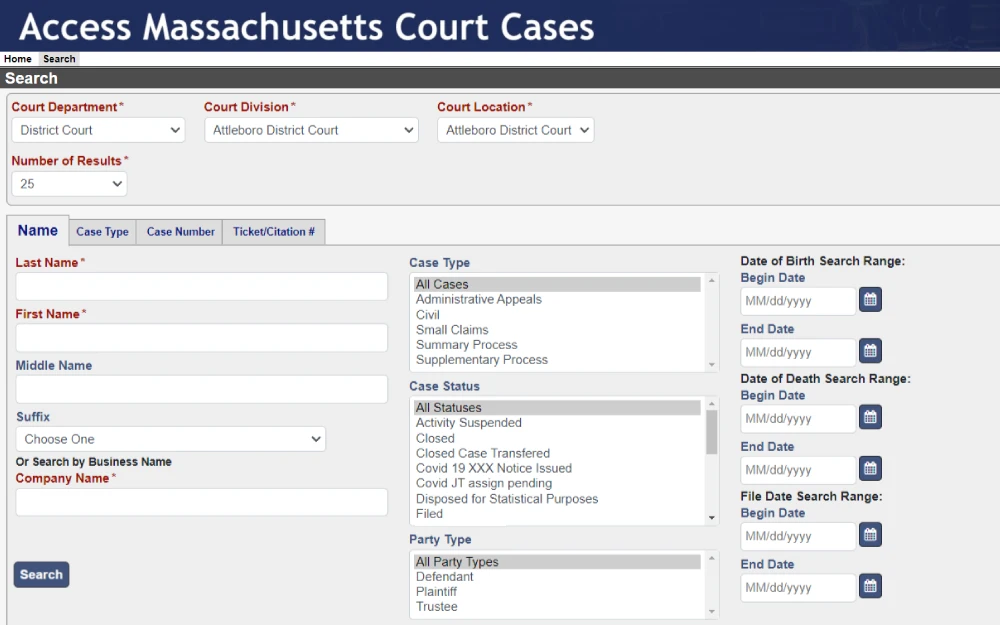
District Court: The District Court is responsible for criminal misdemeanors and felonies punishable by up to five years in prison.2
Superior Court: The Superior Court is responsible for all felonies with a sentence greater than five years, including murder cases.3
When using the Massachusetts Courts unified case search tool, your first step will be to select the Court Department. Depending on the information you are looking for, you will select the District Court or Superior Court. Next, you will select the Court Division, which allows you to select the specific district or superior court by location.
Note: This online search tool does not allow you to search all counties or courts simultaneously. While this is a unified case search tool, you must perform targeted searches for warrant information.
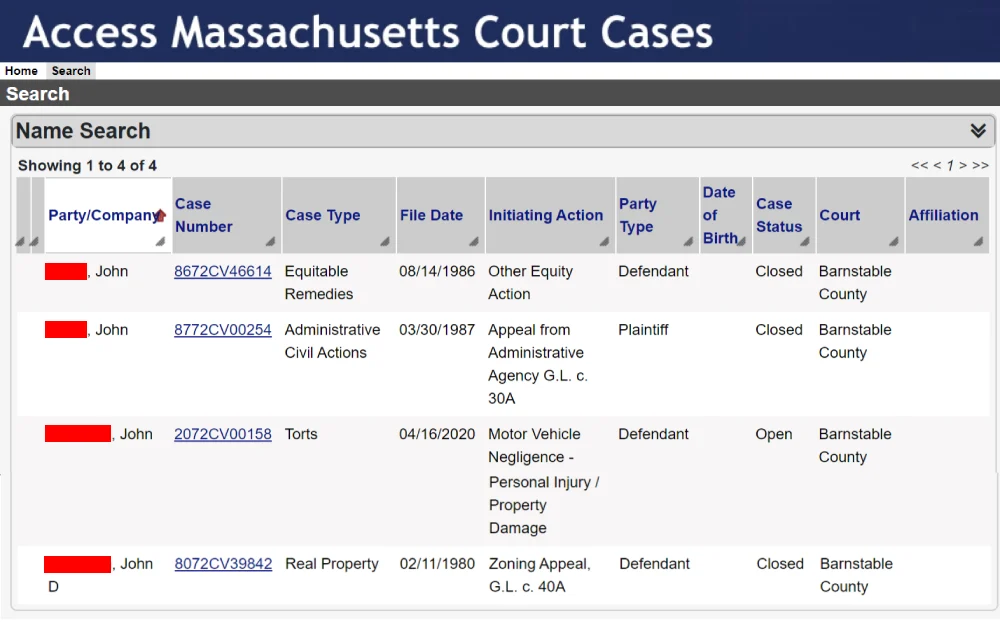
After you enter this information, you can search by case number or name. If you are performing a name-based search, you can select the case type to restrict your search to criminal cases.
If you do not have the person’s name but have other information, you may want to search just by case type. This option allows you to avoid entering a name and narrow your search to a specific city or town.
Regardless of the type of search you perform, you can also narrow your search by selecting the case status (e.g., active, closed, etc.) and a filing date range.
Once you complete your search, the results page will provide general summary information such as the person’s name, criminal offense and case status. To view warrant information, click on the case number for the complete criminal record.
The complete criminal record will contain several tabs of information.
To access warrant information, click on either the event tab or docket. These two tabs contain a chronological listing of all court events and orders in a particular case. If a warrant was issued for a particular criminal case, the information will be listed in these sections.
While you can access this warrant information online, you may be looking for a greater level of detail. If that is the case, you can take the information you have here (e.g., case number, name, etc.) and perform a search at the county level where the criminal case was handled. This option will be discussed in greater detail below.
Note: The Massachusetts State Police and Department of Corrections each provide their own Most Wanted lists.5 These are lists of people that are wanted for serious and violent crimes in Massachusetts.
Search for Warrants at the County Level in MA (Courts & Law Enforcement Agencies)
Another option for conducting a Massachusetts warrant search is to look for this information with government agencies at the county level.
There are many reasons to perform a county-level search. First, you may be able to get a greater level of information than when conducting an online search at the state level. In addition, you may find that the process is easier, or it’s more helpful to have an option in which you can talk to someone in person.
Whatever your basis for performing a search at the county level, it is important to understand that each agency may have its own process for accessing or requesting warrant information. Below, information needed to look for warrant information in the three largest counties in Massachusetts will be provided.
Middlesex County is the largest county in Massachusetts by population. To perform a warrant search in this county, you can start by contacting the Middlesex County Sheriff’s Office.6 You can make a public records request by reaching out to their Records Access Officer.
A record seeker can email them at [email protected] or call them at 781-960-2800.
You may also want to consider reaching out to the Middlesex County Sheriff’s Office Warrant Apprehension Unit. You can contact them at 617-682-4890 or 617-547-1171. To talk to anyone in person at the Middlesex County Sheriff’s Office, you can go to the address below:
Middlesex County Sheriff’s Office
12 Gill St., Ste. 4700
Woburn, Massachusetts 01801
If you would like to view warrant information through criminal case records, you can contact the Middlesex County Clerk’s Office.7
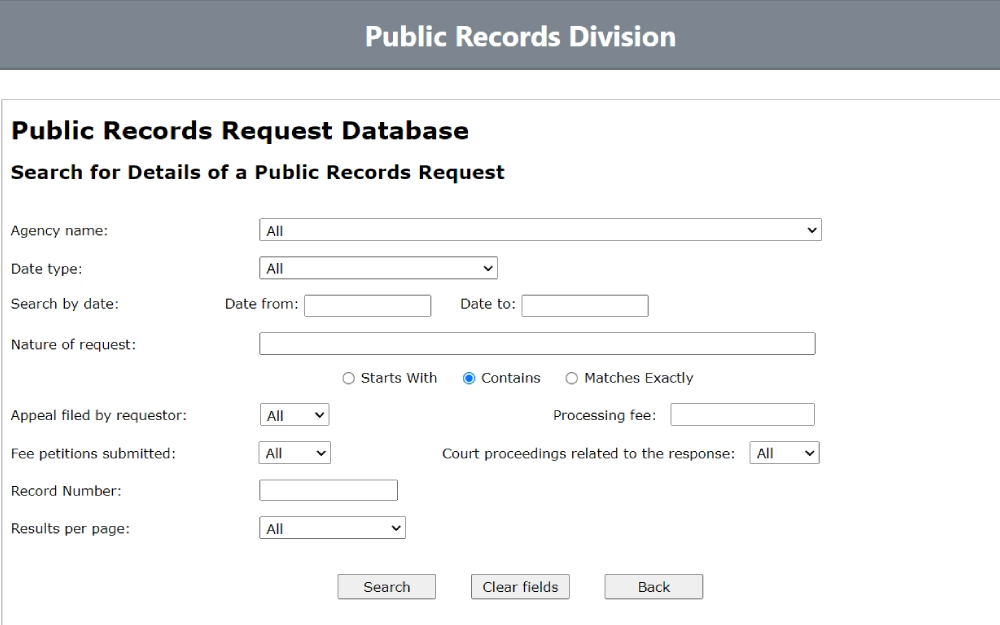
You can email them at [email protected] or reach out by phone at 781-939-2700. If you plan to go to the Clerk’s Office, they are located at the following address:
Middlesex County Superior Court
2nd Floor, 200 Trade Center
Woburn, Massachusetts 01801
You can also reach out to the Middlesex County District Attorney’s Office to make a Public Records Request.9
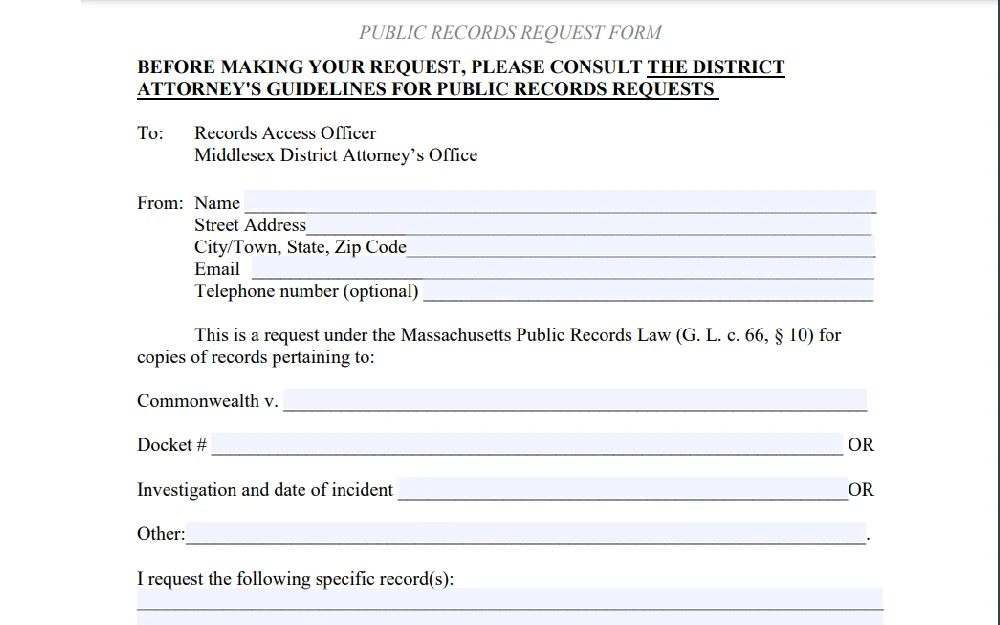
To make a request, you can email them at [email protected] or call them at 781-897-6870. You can send a written request or talk to someone at the address below:
Middlesex District Attorney’s Office
Public Records Access Officer
15 Commonwealth Ave.
Woburn, Massachusetts 018101
Lastly, you can also contact any District Court in Middlesex County for records from their courthouse.
The second largest county in Massachusetts is Worcester County. In this county, if you want to look for warrant information, you can contact the Worcester County Sheriff’s Office. The Worcester County Sheriff’s Office maintains a Wanted Persons List for all individuals with active warrants in the county.
For additional warrant information from the Worcester County Sheriff’s Office, you can contact the Records Department by phone at 508-854-1800 (Ext. 6402). You can also talk to someone at their office located at:
Worcester County Sheriff’s Office
5 Paul X. Tivnan Dr.
West Boylston, Massachusetts 01583
You can also access criminal case records with the county courts for warrant information. A citizen can reach out to the Worcester County Clerk of Court for information on the process of searching and accessing these records.
You can email them at [email protected] or call them at 508-831-2300. You could also go to the address below and talk to someone in person:
Worcester County Superior Court
225 Main St.
Worcester, Massachusetts 01608
Other criminal records may be in the custody of the Worcester District Court. You can contact the Clerk’s Office by email at [email protected] or by phone at 508-831-2010. They are located at the same address above as the clerk for the Worcester County Superior Court.
The third most populated county in Massachusetts is Essex County. For warrant information in Essex County, a citizen can contact the Essex County Sheriff’s Department. You may call them at 978-750-1900 or talk to someone face to face at the address below:
Essex County Sheriff’s Department
20 Manning Ave.
Middleton, Massachusetts 01949
To access warrant information through criminal records, you can contact the Essex County Clerk of the Superior Court. You can call them at 978-744-5500 or email them at [email protected]. Their office is located at the following address:
Essex County Superior Court
56 Federal St.
Salem, Massachusetts 01970
Check With Municipal Agencies & Courts in Massachusetts for Warrant Details
You can also find a warrant issued in Massachusetts through its municipal agencies. They may have warrant information that is not as easy to access at the county or state level.
The largest city in Massachusetts and the state capital is Boston. If you want to find local warrant information, you can request information from the Boston Police Department.11
You can email them at [email protected] or call them at 617-343-4633. They are available Monday through Friday, from 8:30 AM to 4:00 PM.
To make a request in person, you can go to the location listed below:
Boston Police Department Headquarters
Public Service Unit
1st Fl., One Schroeder Plaza
Boston, Massachusetts 02120
Worcester is the second-largest city in Massachusetts by population. For warrant information, you can try submitting a public records request or contacting the Worcester Police Department. You can call them at 508-799-8600 or go to:
Worcester Police Department
9-11 Lincoln Square
Worcester, Massachusetts 01608
The third largest city in Massachusetts is Springfield. To get warrant information in this city, you can try contacting the Springfield Police Department’s Records Bureau.12
You can email them at [email protected] or by phone at 413-787-6310. They are located at the address below:
Springfield Police Department
130 Pearl St.
Springfield, Massachusetts 01105
Broaden the Search From Massachusetts to Federally Issued Warrants
Aside from records found while running a Massachusetts warrant search, warrants can also be issued by federal law enforcement agencies.
If you are looking for federal warrant information, you have a couple of options as outlined below.
FOIA Request: The U.S. Marshall’s Office is responsible for executing the majority of warrants for federal law enforcement agencies. One option is to submit a FOIA request with the U.S. Marshall’s Office for any available warrant information.13 This can be a tricky request, and if you don’t have experience with this, you may want to seek the counsel of a licensed attorney who is knowledgeable in this area.
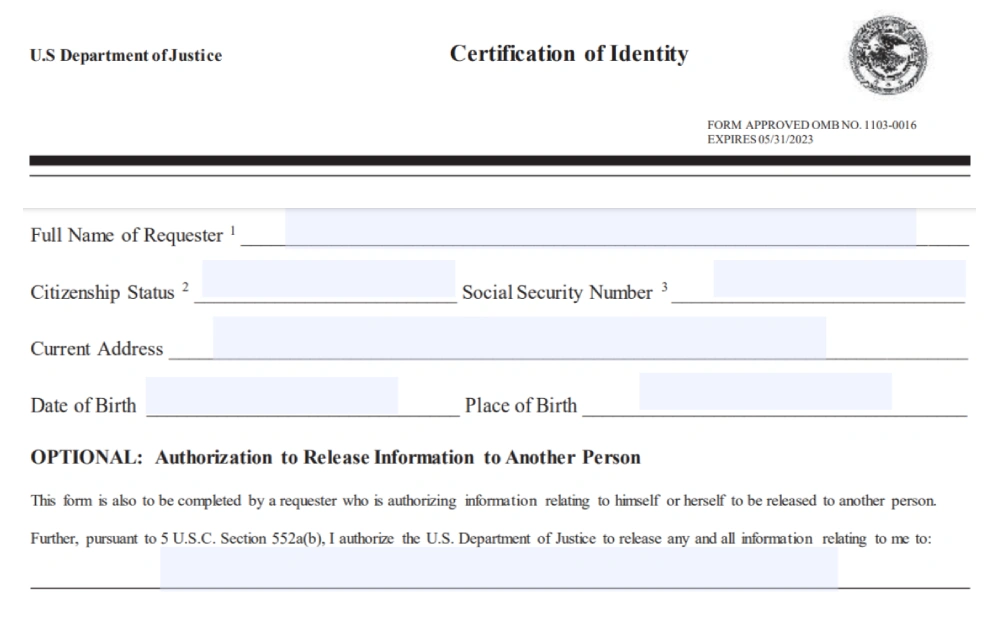
Search Public Access to Court Electronic Records (PACER): This is a great search tool for looking up warrant information; however, the service is fee-based. If you do use this service, you can search for warrants issued by federal agencies by performing a name search.
Once you select a case, you can view the particular criminal record. Scroll to the Docket Sheet or History Section, where you can find any available warrant information.
Outside of searching or requesting this information, you can also see the most wanted individuals with outstanding warrants for various federal agencies. The Federal Bureau of Investigation (FBI) provides a most wanted list of their ten most notorious fugitives.15 When you click on a person, you can see their wanted poster, various pictures and other identifying information.

The Department of Justice (DOJ) has a list of its fifteen most wanted fugitives. When you click on a person, you can get their mugshot, descriptive information (e.g., sex, eye color, weight etc.) and the reason they are wanted.
You can also view the Drug Enforcement Agency (DEA) Fugitive List. The list contains the offender’s descriptive characteristics as well as the specific federal violations they committed.
Types of Warrants in Massachusetts & Their Definitions
There is more than one kind of warrant in Massachusetts. Warrants are classified by what triggers their issuance as well as the ultimate purpose they serve. In Massachusetts, during your research you may encounter several different warrants, such as those listed below with brief descriptions.
Straight Warrants: A straight warrant is issued by the court to arrest a criminal suspect. A court issues this type of warrant once either a prosecutor or law enforcement submits evidence to establish probable cause that a particular suspect committed a crime.
A straight warrant may also occur if an offender violates the terms of either their probation or parole. A probation or parole warrant can result in having those rights revoked and the serving of one’s sentence in prison.16
Default Warrants: This type of warrant is issued by a judge when a defendant fails to show up for court. This often occurs in situations where a person was arrested, posted bail and then failed to show up for a subsequent hearing. In many states, this is referred to as a bench warrant.
Warrants can also be issued if a person fails to pay child support or fails to comply with a court judgment (referred to as a “Capias pro fine warrant”).
Search Warrants: This is different from the above warrants in that the purpose is not to bring a particular person into custody or before the court.17 Instead, this warrant allows law enforcement to search and seize property believed to be used in the commission of a crime.
Like an arrest warrant, law enforcement is required to present probable cause evidence that a certain specific location contains this type of property.
Note: An active warrant is simply one that has not been executed yet.
What Should I Do if I Find Out That I or Someone Else Has a Warrant in Massachusetts?
At this point, you should have a good understanding of the warrant process and how to access this information through many different mediums. However, you also need to know what to do with this information once you receive it. What you do depends on who the warrant is for and why.
You Have a Warrant: If you find out that you have an active warrant, it is time to be proactive and resolve it before it becomes a greater problem. If it’s a default warrant, you may be able to clear the warrant without serious consequences. To do so, you can call the clerk of the court where the warrant was issued and see what you can do to resolve the matter (e.g., pay a fine or reschedule a court date).
If you have an active straight warrant, you will need to turn yourself in. However, before you do that, it would be beneficial to talk to a licensed criminal defense attorney to prepare you for the process and provide guidance on what you should and should not do.
In addition, to make any potential bail process go smoothly, you should also consider contacting a bail bondsman. Lastly, make sure you let family and close friends know so they are prepared.
Someone Else Has a Warrant: If someone else has a warrant, first consider your relationship with the person and the severity of the situation. If it’s a minor offense and you have a relationship with the person, you should contact them and let them know. However, if you do not know the person well, you might just want to reach out to a family member or friend.
If the matter is more serious (e.g., felony warrant), you should carefully consider your response. It may be best to contact the law enforcement agency responsible for executing the warrant. They are best equipped to resolve the matter in a safe manner.
You should now have a better understanding of warrants, what you need to search for them and what you should do with any information you uncover.
In addition, you are now equipped with a variety of resources for performing a Massachusetts warrant search at the state, county and municipal level; furthermore, you can track down MA arrest and criminal history details or review all free Massachusetts public information for details on court cases, background checks, births, deaths, property, and much more.
References
1Commonwealth of Massachusetts Court System. (n.d). Trial Court Case Access. Retrieved November 22, 2023, from <https://www.masscourts.org/eservices/home.page.2>
2Massachusetts Court System. (n.d). District Court. Retrieved November 22, 2023, from <https://www.mass.gov/orgs/district-court>
3Massachusetts Court System. (n.d). Superior Court. Retrieved November 22, 2023, from <https://www.mass.gov/orgs/superior-court>
4Commonwealth of Massachusetts Court System. (n.d). Name Search Results. Retrieved November 22, 2023, from <https://www.masscourts.org/eservices/searchresults.page>
5Massachusetts State Police. (n.d). Most Wanted. Retrieved November 22, 2023, from <https://www.mass.gov/info-details/state-polices-most-wanted>
6Massachusetts Court System. (n.d). Middlesex County Superior Court. Retrieved November 22, 2023, from <https://www.mass.gov/locations/middlesex-county-superior-court>
7Middlesex County Sheriff’s Office. (n.d). Public Records. Retrieved November 22, 2023, from <https://www.middlesexsheriff.org/public-information/pages/public-records>
8Massachusetts Public Records Division. (n.d). Public Records Request Database. Retrieved November 22, 2023, from <https://www.sec.state.ma.us/RequestSearchWeb/Webpages/SearchResultsDetail.aspx>
9Middlesex County District Attorney’s Office. (n.d). Public Records Requests. Retrieved November 22, 2023, from <https://www.middlesexda.com/public-information/pages/public-records-requests>
10Middlesex County District Attorney’s Office. (n.d). Public Records Requests Form. Retrieved November 22, 2023, from <https://www.middlesexda.com/sites/g/files/vyhlif4691/f/uploads/public_records_request_form.pdf>
11Boston Police Department. (n.d). Get A Copy Of A Police Report. Retrieved November 22, 2023, from <https://police.boston.gov/how-to-get-a-copy-of-a-police-report/>
12Springfield Police Department. (n.d). Records Bureau. Retrieved November 22, 2023, from <https://springfieldmapolice.com/records-bureau/>
13United States Marshals Service. (n.d). Freedom of Information Act Portal. Retrieved November 22, 2023, from <https://foia.usmarshals.gov/app/Home.aspx>
14United States Department of Justice. (n.d). Certification of Identity. Retrieved November 22, 2023, from <https://foia.usmarshals.gov/app/doj_361form.pdf>
15Federal Bureau of Investigation. (n.d). Ten Most Wanted Fugitives. Retrieved November 22, 2023, from <https://www.fbi.gov/wanted/topten>
16The General Court of the Commonwealth of Massachusetts. (n.d). Chapter 127 – Section 149. Retrieved November 22, 2023, from <https://malegislature.gov/Laws/GeneralLaws/PartI/TitleXVIII/Chapter127/Section149>
17The General Court of the Commonwealth of Massachusetts. (n.d). Chapter 126. Retrieved November 22, 2023, from <https://malegislature.gov/Laws/GeneralLaws/PartIV/TitleII/Chapter276>
